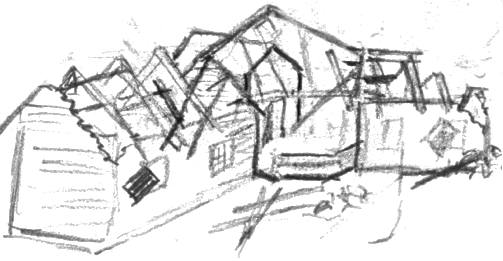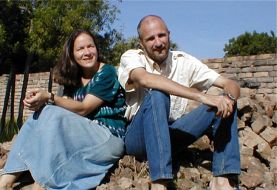
|
Download this newsletter |
People who spend too much time meditating on their legacy get themselves into trouble - usually of the megalomania sort. In this letter, however, we dare to tread these treacherous shoals, in the hope that by doing so, we will, as the sage put it, "number our days and gain a heart of wisdom."

50 years from now our beautiful home in Chageen will be a termite riddled, bat infested shell. The young trees that we have planted will stretch their now-mature limbs over the roofless ruins and a young missionary from another generation will walk through the broken masonry and wonder what it must have been like at the turn of the century when the Vanderkoois still lived in it. Like every good thing in Africa, the home in which Mark has invested no small amount of effort to make comfortable since before we were married will return to the dust from whence it came.
Will we leave any legacy besides the shell of our home for the young missionary to ponder as he walks under the trees? Will there be any evidence of our ministry during the twenty or thirty years we lived and worked here? These sobering thoughts come to us frequently. We earnestly hope that our legacy will be more than the ruins of a home.
 A
plausible, and indeed laudable candidate for an enduring legacy among the Kwong
would be the translation of the Scriptures into their language. Indeed, we will
consider ourselves blessed if by grace we might be so honored to finish it. We
certainly spend a lot of time to that end. But we have come to realize that this
too is a legacy not much more durable than the masonry, wood, and steel which
our home is made of. The pattern is already familiar in other languages -
the press run is sold out; termites, weather, and carelessness of children take
their toll; and as the years go by, fewer and fewer of dog-eared copies of some
old missionary's labor of love remain. And Africa being what it is, another
press run is seldom forthcoming.
A
plausible, and indeed laudable candidate for an enduring legacy among the Kwong
would be the translation of the Scriptures into their language. Indeed, we will
consider ourselves blessed if by grace we might be so honored to finish it. We
certainly spend a lot of time to that end. But we have come to realize that this
too is a legacy not much more durable than the masonry, wood, and steel which
our home is made of. The pattern is already familiar in other languages -
the press run is sold out; termites, weather, and carelessness of children take
their toll; and as the years go by, fewer and fewer of dog-eared copies of some
old missionary's labor of love remain. And Africa being what it is, another
press run is seldom forthcoming.
As it turns out, the only thing that endures in Africa are traditions. The very thing that sometimes blesses but mostly frustrates every missionary, aid worker, or diplomat who sets foot on this continent is precisely that thing which will remain after he or she boards the airplane for the last time. Even the people in whom we have invested so much will perish - probably sooner than our house. But traditions remain from generation to generation - a blessing or a curse to their keepers.
In a very real sense, the protestant church in Chad, with whom we work is, like everything else, a collection of traditions - both good and bad, Biblical and unbiblical, those which save, and those which frankly damn. What impact we have in shaping these traditions will, it seems, in large measure determine what kind of legacy, if any, a young missionary walking through the ruins of our home will be aware of 50 years hence.
Mark has ministered among the Kwong for 12 years and Diane for 3. During these many years, we have learned to speak the language fluently, we have translated large portions of Scripture, we have developed a Biblical theology in the language, produced literacy materials, taught men and women to read, held countless discipleship classes, and spent many days teaching and preaching in the churches and the public squares of Kwongland. This is no mean achievement, and yet, a disinterested observer would probably conclude that on the whole, the Kwong church is still not substantially different than it was in 1991. To say this is a sobering realization would be an understatement.
We cannot but conclude that we need to invest more in the church, and correspondingly less - at least for the time being - in the production of translation, literacy, and theology materials. In fact, what we have already produced is plenty until such time as the church develops the habit (tradition) of using consistently what we have already produced. Meanwhile, we are refocusing our ministry on three things:
Ø Discipling key women and teaching them to read. This is something Diane began before our stint in N'Djamena, and a strong case has been made by people much wiser than us that women hold the keys to enduring traditions in Africa. We can do no better than continue the investment she has already begun in this direction.
Ø Organizing a three year cycle of concentrated re-training of the Kwong pastors using the Scripture portions and theology materials we have developed over the years. This course will meet twice a year for three weeks and will be compulsory. As it stands today, many of the 20-odd Kwong pastors can barely read, much less preach.
Ø Seeking to increase the depth and breadth of the gospel’s penetration of Kwong society. Presently, the majority of really strong Kwong believers come from only a few extended families, and all Kwong believers represent something like 3% of the total population. There is no tradition of evangelism, and indeed no one (including ourselves) is quite sure how to house-to-house evangelism in a culturally suitable way. We intend during this year to begin doing some serious experimenting to rectify this deficiency.
As we resume our ministry in Chageen after a year of admin duty in N’Djamena, these are the things that are on our hearts. Please pray with us for wisdom and perseverance in doing them
 But each one should be careful how he builds. For
no one can lay any foundation other than the one already laid, which is Jesus
Christ. If any man builds on this foundation using gold, silver, costly stones,
wood, hay or straw, his work will be shown for what it is, because the Day will
bring it to light. It will be revealed with fire, and the fire will test the
quality of each man's work. If what he has built survives, he will receive
his reward. If it is burned up, he will suffer loss; he himself will be saved,
but only as one escaping through the flames. (1 Corinthians 3:10-15, NIV)
But each one should be careful how he builds. For
no one can lay any foundation other than the one already laid, which is Jesus
Christ. If any man builds on this foundation using gold, silver, costly stones,
wood, hay or straw, his work will be shown for what it is, because the Day will
bring it to light. It will be revealed with fire, and the fire will test the
quality of each man's work. If what he has built survives, he will receive
his reward. If it is burned up, he will suffer loss; he himself will be saved,
but only as one escaping through the flames. (1 Corinthians 3:10-15, NIV)